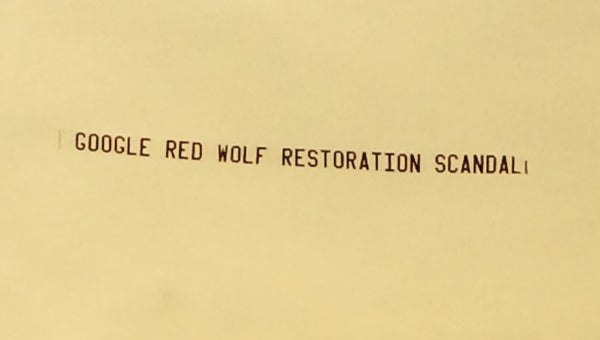Beaufort County hunters speak out about coyote hunting ban
Published 12:05 pm Tuesday, July 8, 2014
I doubt if Federal Judge Terrence Boyle realized exactly what effect his decision to temporarily ban all coyote hunting in the five-county core area would have on local hunters. Essentially, his order made it a federal crime to shoot coyotes and made it legal to shoot a red wolf, as long as it was off federal property, on private land and reported to the proper authorities as a “taking.” To say that his decision upset local hunters would be highly understated.
One of the reasons that the U.S. Fish and Wildlife Service chose eastern North Carolina as their experimental recovery area for the wolves was that there were no coyotes here to interbreed with red wolves.
This controversial federal decision came about after someone shot and killed several red wolves after the North Carolina Wildlife Resources Commission (NCWRC) legalized the shooting of coyotes at night by using spotlights. Supposedly, whoever killed the red wolves shot them after mistaking them to be coyotes. Using the wolf killings as an excuse to sue the NCWRC, several animal rights groups sued the NCWRC for having coyote hunting at night made illegal. After some time, Judge Boyle granted the pro-wolf forces a temporary injunction that put a stop to all coyote hunting — day or night — in the five eastern North Carolina Counties where the red wolf recovery program is being held.
Last week’s hearing was to help the N.C. Wildlife Resources Commission gather information that will, hopefully, let Judge Boyle lift the injunction and allow our hunters to again take coyotes.
In the middle of all this red wolf controversy are findings uncovered by one eastern North Carolina landowner that expose the failure of the USFWS to live up to their promise. A promise that it would promptly remove, upon any private landowners request, any red wolves that might wander off federal refuges. Information was also uncovered that vividly exposes facts about the utter failure of the red wolf program to “re-establish a breeding population of red wolves in eastern North Carolina.”
Of the 75 to 80 people attending the hearing in Columbia last week only two spoke out in favor of the red wolves and the ban on hunting coyotes. About 37 people spoke against the coyote hunting ban and the restoration of red wolves in our state.
One man that spoke out in opposition to the red wolves and the ban on coyote hunting had his wife and infant daughter along. At one point in his testimony, he asked his wife to hold up his infant daughter and asked the audience if they’d let their young children out to play in a yard where wolves or coyotes were about. The audience’s response was unanimous.
Engelhard resident and well-known outdoorsman, trapper and conservationist Marco Gibbs spoke against the red wolf project and coyote-hunting ban. Gibbs had trapped and released over a hundred red wolves and even more coyotes since the project began in 1987. His ideas on the misappropriation of federal monies and administration of the entire wolf restoration project left no doubt that he was opposed to the red wolf project.
Other landowners and outdoorsmen across Eastern North Carolina spoke out against the red wolf project and the ban on coyote hunting, stating that the 28-million dollars that had been spent on the red wolves over the years was a waste and that the money could have been spent on something else.
Tyrell County landowner Jett Ferebee’s comments to the NCWRC stated that, “The three conditions that led to red wolves being removed from the wild in Texas and the Smoky Mountains exist here in eastern N.C. in spades. Hybridization, low pup recruitment and the inability to maintain the program on Federal land all exist here in eastern N.C.
“Now please do the right thing. It will be in the best interest of all, including the Red Wolf. Is it not time to call this 27-year-old experiment what it is, a failure? Save the wolves from extinction due to hybridization and relocate the wolves where they can be maintained safe from extinction.”






